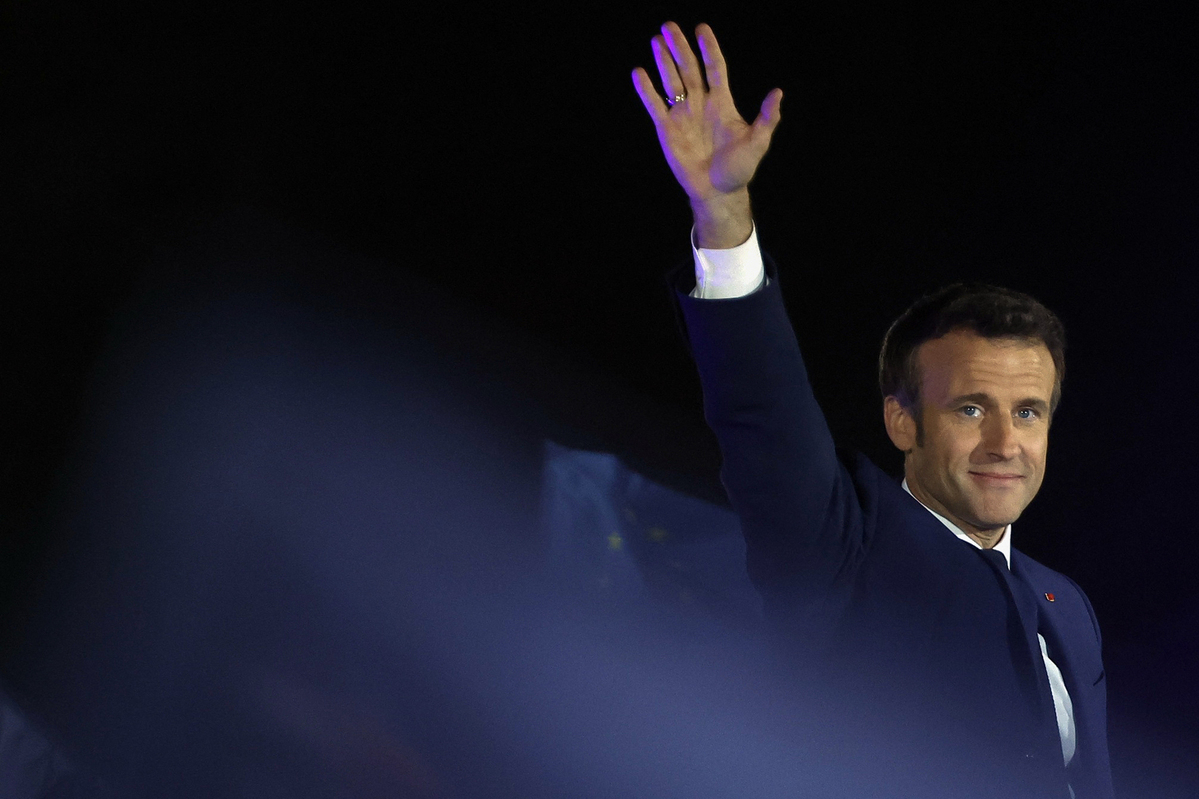Apr 25, 2022, 21:44

France's President Emmanuel Macron beat his far-right rival, Marine Le Pen, in the second-round runoff on Sunday and won another five-year term in office.
Macron won 58.8 percent of the votes compared to 41.2 percent by Le Pen, according to an estimate from the Ipsos polling institute after most polling stations closed at 7 pm local time; those in large cities, such as Paris, closed at 8 pm.
Some 48.7 million French people were registered to vote. Voter abstention stood at 28 percent, up by 2.5 percentage points from 2017.
The 44-year-old Macron has, therefore, become the first president of France to win re-election since Jacques Chirac in 2002.
Macron and Le Pen had a similar face-off in the 2017 election runoff, when Macron won 66 percent of the votes to Le Pen's 34 percent, making the then 39-year-old Macron the youngest president in France's history.
Both Macron and Le Pen cast their votes in the morning, with Macron casting his ballot in the northern French town of Le Touquet-Paris-Page, accompanied by his wife and first lady Brigitte Macron.
Macron, who is a centrist, won the first round of the election on April 10 by securing 27.8 percent of the ballots cast against Le Pen's 23.1 percent.
The two rivals had spent much time and effort after that first round trying to woo voters who supported leftist candidate Jean-Luc Melenchon, who got 22 percent of votes in the first round.
Melenchon did not publicly endorse Macron but told his supporters on April 10 that they should not give "a single vote" to Le Pen.
Macron cashed in on the concerns of Melenchon's supporters about climate change while Le Pen sought to win them over by framing the election as a referendum on Macron's performance during the past five years, citing rising living costs, especially energy prices, and many other social and economic problems.
Macron's presidency in the last five years has been marred by the anti-government Yellow Vest movement, which lasted for many months after November 2018, when the public vented grievances about fuel taxes and other social and economic problems. Macron was viewed by many protesters as a president for the wealthy.
He was the last of a dozen candidates to announce his bid for the job of president, declaring his interest only 38 days before the first round on April 10.
Before Sunday's vote, there had been great concerns in the United States and the European Union about the possibility of a Le Pen victory, because she has long been critical of both NATO and the EU.
While Le Pen has condemned Russia for its activities in Ukraine, she is known for her close relations with Russia's President Vladimir Putin.
The 53-year-old earlier stated her desire to pull France out of NATO's integrated command structure "so as to be no longer caught up in conflicts that are not ours".
While Le Pen's party, the National Rally, is no longer talking about leaving the EU, the Schengen visa-free zone and the euro currency, she has been widely viewed as a euroskeptic.
France is the second-largest economy in the EU, after Germany. It is also the bloc's only nuclear power and its only permanent member of the United Nations Security Council.
The French presidential election took place at a time when France assumes rotating presidency of the Council of the European Union for the first six months of this year.
Tomasz Michalski, an associate professor of economics and decision sciences at HEC Paris, said Le Pen had a striking chance to win according to the polls after the first round of voting, but that there were questions later about the viability of her economic program and left-wing voters were reminded of her stances on immigration and cultural issues.
Michalski said Macron's two weeks of campaigning was intense after a haphazard campaign before the first round, and Macron successfully reminded voters that a Le Pen presidency would not solve current problems.
"Macron's victory is, in fact, a narrow one. It would be inappropriate to claim that his score reflects true support; many voted for him against Le Pen. It's unclear what big changes will be made during the next five years apart from a much-needed pension reform," he said.
Michalski noted that Le Pen's haul of the vote showed considerable progress and interest in her ideas.
"The underlying problems that led to the ascendance of Le Pen remain unresolved: deindustrialization, high unemployment among the least skilled, labor market polarization, a great urban divergence, the 'gig' economy, hollowing of public services, especially in small cities and rural areas, one of the lowest upward mobilities in OECD countries," Michalski said.
"It's unclear what of Macron's policies can help suffering areas, unless some general quick growth resumes, which, in the current international political and economic situation, is unlikely," he added.
You stated that 'least two years before the EU countries can wean themselves off under US duress from their dependence on Russia's gas and oil'.
Anyone out there being able to name the other 8 EU countries paying Russia in rubles for oil or gas. Hungary and Austria openly said so.
Please name the other cowards.
'to have itself fried evenly over a slow fire to ensure thoroughness'
The truth is, English being rosbif while France actually derives from the Franks, a germanic people. The Franks and the Alemanni were tribal people who moved around. The Romans called both of those people "Germans". Dring the Dark Ages, the Franks stayed where France is now, and the Alemanni stayed where Germany is now, but Charlemagne was a Frank, but the Germans call him Karl der Grosse, and claim him as being German.
German is a Germanic language, French is an Italic language but derived from the same proto language Indo European languages, and split off around 1,000 BC.
America in contrast are 'rosbif' eaters since theyre the same people.
If at all, it will take at least two years before the EU countries can wean themselves off under US duress from their dependence on Russia's gas and oil.
For Germany's industries, this could be an insurmountable problem which will weigh on Germany as biggest contributor to the health of EU's consolidated accounts.
Which means countries like Italy, Greece, Spain and Portugal which depend on EU financial help will become more indebted and thus more credit underrated.
The Scandinavian countries are beholden to their social safety net and will course along.
That leaves France and post-Brexit UK.
The UK is basically London finance which in fact acts as the world's money laundrymat. It recirculates money from elsewhere, earns hefty commissions and upkeeps an expensive lifestyle untied to real productivity. It is also a tourist destination acculturated with an internationally open society but steeped in english language lore. It also has some bioscience and informatics research in the Oxbridge areas. Since Blair, it has tied its fortunes and future to its ex-colony, the US, which will only suck out its technical corps for the US' own MAGA-juiced projects.
That leaves Macron's France. Which is more into luxury goods as Germany is (was) into capital goods. Also, Macron who is to international diplomacy with some hint (some only) of autonomy what Merkel was to pro-Asia (especially China) trade-centered realpolitik. Stoltz is however fast becoming a US proxy because of fellow natives Baerbock and von der Leyen who are bolstered by the EU's Borrell Fontanelles and Nato's Stoltenberg, behind whom the US' Victoria Nuland, one of the architects of US radicalization of Zelensky's Ukraine.
Will the CAI be revived? That depends on the strength of Macron to revive Merkel's aspirations for a EU-China bridge when he chairs the EU's rotating presidency.
it is however unlikely the US will not do anything against that. More likely, the US will use the Ukraine situation to try and burn the bridge to the ground and erect a wall instead, in line with its congressional bills to decouple from China, recouple with Europe and maintain its status quo.
However a status quo which has only seen too many wars and non-UN unilateral sanctions the US has been waging across the globe over the years while Europe' was post-WWI& II busy moralizing about human rights and rules of engagement.
Dead men have no rights, it seems. Strangely, this is lost on the Europeans, ex-colonizers incarnate.
The Europeans shouldn't have to subscribe to the cynical but canny saying by the Mexicans: 'the US is my best friend, whether i like it or not.'
After all, didn't the West's renaissance start in Europe after it learned how to use paper from China?
ren
Whites in North Amercia have their roots in Europe.
French President should not listen and act according to request from across the Atlantic. France is no a colony of US. So is the rest of Europe.
UK exhibits its core nature to be sycophant of US but only to have itself fried evenly over a slow fire to ensure thoroughness.
Community login








Add a comment